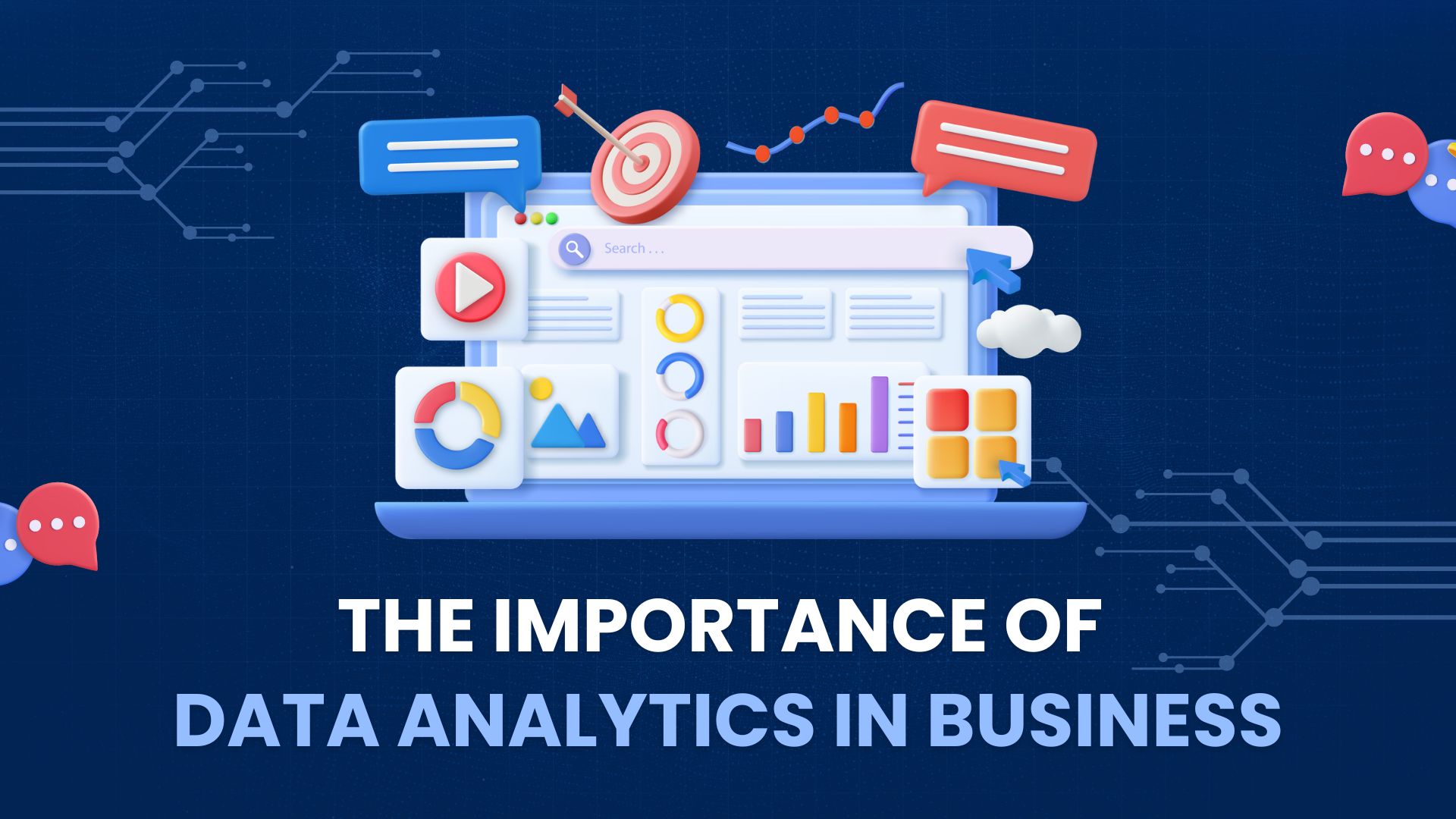The Importance of Data Analytics in Business

In the digital age, data has become one of the most valuable assets for businesses. The ability to analyze and interpret this data effectively can provide significant insights, drive strategic decisions, and enhance overall business performance. In this blog, we will explore the importance of data analytics in business, its various applications, and how companies can leverage data to gain a competitive edge.
Driving Informed Decision-Making
Data analytics enables businesses to make informed decisions by providing a comprehensive understanding of various factors affecting their operations. This process involves collecting, processing, and analyzing data to extract meaningful insights.
Key Benefits:
1. Evidence-Based Decisions: Data-driven decisions are based on factual information rather than intuition, reducing the risk of errors and improving accuracy.
2. Predictive Insights: Predictive analytics uses historical data to forecast future trends, helping businesses anticipate market changes and plan accordingly.
3. Performance Metrics: By analyzing key performance indicators (KPIs), businesses can measure their progress and identify areas for improvement.
Impact:
1. Improved strategic planning and resource allocation.
2. Enhanced ability to respond to market trends and customer needs.
3. Increased efficiency and effectiveness in business operations.
Enhancing Customer Experience
Understanding customer behavior and preferences is crucial for delivering personalized experiences and building long-term relationships. Data analytics helps businesses gain deep insights into customer interactions and satisfaction levels.
Key Benefits:
1. Personalization: Analyzing customer data allows businesses to tailor their products, services, and marketing efforts to meet individual needs and preferences.
2. Customer Segmentation: Businesses can segment their customer base into distinct groups based on behavior, demographics, and other criteria, enabling targeted marketing campaigns.
3. Customer Feedback: Analyzing feedback and reviews helps businesses understand customer pain points and areas for improvement.
Impact:
1. Increased customer satisfaction and loyalty.
2. Higher conversion rates and customer retention.
3. Enhanced brand reputation and competitive advantage.
Optimizing Operations and Reducing Costs
Data analytics can identify inefficiencies and bottlenecks in business processes, leading to streamlined operations and cost savings. By analyzing operational data, businesses can uncover patterns and trends that impact productivity and profitability.
Key Benefits:
1. Process Optimization: Identifying inefficiencies in production, supply chain, and other operational areas allows businesses to implement improvements and optimize workflows.
2. Resource Management: Data analytics helps in efficient allocation and utilization of resources, reducing waste and operational costs.
3. Risk Management: Analyzing risk factors and historical data enables businesses to anticipate and mitigate potential risks, ensuring smoother operations.
Impact:
1. Reduced operational costs and increased profitability.
2. Improved efficiency and productivity.
3. Enhanced ability to manage risks and uncertainties.
Gaining Competitive Advantage
In today’s competitive market, staying ahead requires continuous innovation and adaptation. Data analytics provides businesses with valuable insights into market trends, competitor strategies, and industry developments.
Key Benefits:
1. Market Analysis: Understanding market dynamics and customer preferences helps businesses identify new opportunities and stay ahead of the competition.
2. Competitor Analysis: Analyzing competitors’ performance and strategies enables businesses to benchmark their own performance and identify areas for improvement.
3. Innovation: Data-driven insights can inspire new product development, marketing strategies, and business models.
Impact:
1. Enhanced ability to identify and capitalize on market opportunities.
2. Improved strategic positioning and differentiation.
3. Continuous innovation and growth.
Facilitating Data-Driven Culture
Adopting a data-driven culture involves integrating data analytics into every aspect of the business. This cultural shift empowers employees at all levels to use data in their decision-making processes.
Key Benefits:
1. Employee Empowerment: Providing employees with access to data and analytics tools enables them to make informed decisions and contribute to the company’s success.
2. Collaboration: A data-driven culture fosters collaboration across departments, as data becomes a shared resource for achieving common goals.
3. Transparency: Data transparency promotes accountability and trust within the organization, as decisions are based on objective information.
Impact:
1. Increased employee engagement and productivity.
2. Improved collaboration and communication across teams.
3. Enhanced organizational agility and responsiveness.
Conclusion
Data analytics has become an indispensable tool for modern businesses, providing valuable insights that drive informed decision-making, enhance customer experiences, optimize operations, and deliver competitive advantages. By embracing data analytics and fostering a data-driven culture, businesses can unlock new opportunities, improve efficiency, and achieve sustained growth in an increasingly complex and dynamic market.
FAQs
What is data analytics in business?
Data analytics in business involves collecting, processing, and analyzing data to extract valuable insights that inform decision-making, improve efficiency, and drive strategic initiatives.
How does data analytics improve decision-making?
Data analytics provides factual, evidence-based insights that reduce reliance on intuition and help businesses make more accurate and informed decisions, leading to better outcomes.
What are the benefits of a data-driven culture?
A data-driven culture empowers employees with access to data and analytics tools, fosters collaboration, enhances transparency, and promotes accountability, leading to improved organizational performance.
How can data analytics enhance customer experience?
By analyzing customer data, businesses can personalize products, services, and marketing efforts, segment their customer base, and gather feedback to improve satisfaction and loyalty.
What role does data analytics play in gaining competitive advantage?
Data analytics helps businesses understand market trends, analyze competitor strategies, and identify new opportunities, enabling them to stay ahead of the competition and continuously innovate.







